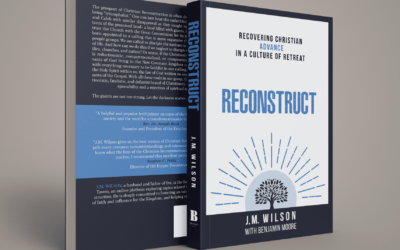Here we have a lesson for those in the reformed church disguised as a slam against the Eastern Orthodox church. Be careful about the emphasis you place on your history and traditions.
A recent popular social media posting was making fun of an evangelical pastor (Eugene Cho) who had made the claim that all the local churches planted by Apostle Paul no longer exist. The point he was trying to make was that it is the kingdom which lasts, not local churches. The tweets in reply from an Eastern Orthodox proponent was to post pictures of the current bishops in modern Corinth, Philippi, and Thessalonica to dunk on the evangelical pastor. “See, our local churches last, unlike your silly churches” being the nana-nana-boo-boo implication.
Let’s set aside the dubious claims of apostolic succession and the conflation of a specific local church with the ongoing presence of the church in a geographical region. Even granting all this, what is the fruit of the Eastern Orthodox church in Greece? Where 90% of the population are members of the Eastern Orthodox Church? The Eastern Orthodox claim to have had a rarely interrupted monopoly on the nation of Greece for two millennia. What does it have to show for it?
It may not be a badge of honor they are hoping for.
Far from a vibrant center of Christendom, today Greece is a sickly and dying nation. Socialist to the core and basically a vassal state of Germany and the European Union, it has one of the worlds lowest birth rates, an aging dying population of only around 10 million, and a crushing load of debt. It had to be bailed out by the EU and the International Monetary Fund and doesn’t even have sovereignty over its own monetary, spending, and taxation policies. The state owns a substantial portion of industry in Greece, and setting up a business there is notoriously difficult. If you want to home educate your children, forget about it because it’s illegal. Not exactly a bastion of Christian fecundity.
If this is what the fruits of hegemony of one particular denomination looks like, it is an embarrassment. Greece simply does not follow the precepts of biblical law applied to society. The Greek Orthodox church either doesn’t know what biblical law is as it applies to society, or it doesn’t care and is content to play in the cathedral sandbox. The fact of the matter is, Greece looks exactly as it should be expected to look with a church dominated by a focus on preserving temple cathedrals, liturgies, praying to dead saints, and maintaining dubious lines of apostolic succession while not pressing the crown rights of Christ and his law into all areas of life.
But before the reformed churches get too judgy, in meaningful ways, we do the same thing, just a lite beer version. We can navel gaze with the best of them. The amount of time we spend dithering in the sandbox is right up their with the Eastern Orthdox. The morally degraded state of affairs in America and the marginalization of Christianity is also exactly what you would expect given much of the theology, organization and practice of her churches, including the reformed ones.
Reformed local church life is highly limited and centered around the activities of attendance of a Sunday gathering where one can sing in worship, receive communion and be “washed” with the water of the word in a sermon. Much like the temple mindset, it is about going to an event, partaking in ceremony (meaningful as it may be) and then reconnecting into the rest of life. Yes you have some attendance at prayer groups and the like but relationships in the church don’t revolve around shared activity in Christian businesses, schools, media, medicine, nutrition, loans, welfare programs and the like. Not enough to create an actual rival social order and Christian civilization.
In the Old Covenant days of the temple, the Levitical Priests had very well defined duties. The worship of the people Israel was entirely centered around the temple and the actions of the Levitical Priests. The Priests were to administer the temple rituals and guard the temple from any who did not belong. Can we really say that in practice, this is all that different from the culture of local churches today?
“The church’s fundamental duty is to preach the word, administer the sacraments and enact church discipline”.
If you are in a reformed church, you have probably heard this about a thousand times. What’s common about all three of these activities? These same churches prescribe that these duties be led and carried out virtually exclusively by ordained officers of the church. The main function, activity and focus of the church then orbits around the duties of the elders and their functions in “temple keeping”.
What did the temple priests do? Teach. Administer Rituals. Guard the temple from intruders. We’ve simply copied this pattern to the local church with the focus of the officer of the church. They teach. They administer rituals. They guard the table. This is impossible to miss.
Even much of the work that is done in the service of helping these tasks be performed (setting up the chairs so people can hear the sermon, sound & video, filling up the Welch’s shot glasses with the fancy squirt bottle) take many of the service “jobs” available in the church. This is not to knock any of these tasks it’s to point out the dilemma this focus creates. A dynamic where most of the activity and service is either centered around being a temple priest or assisting the temple priests complete their temple work.
This also creates a culture where the what the church regards as “service” to the kingdom is almost completely subsumed by tasks carried out to serve the local church. As if the two were one and the same. In addition, since ordained elders can only be men, it creates the perception, if not the reality that the service women do both in and out of the local church context is marginalized.
The sum total effect of all of these practices cannot be understated. The temple model of local church warps our understanding of so many activities in the local church: Buildings, budget, mission, fellowship, service, discipline, giving and more. The result is to drive the church inward with a reductionistic focus. It reduces our impact on the world by creating an environment where Christendom is reduced to so called “temple” activities. To make us obsessed with the shadows and neglect the substance which was always about ethics.
The bulk of our energies become devoted toward “spiritual” activities almost exclusively tried up inwardly in the local church. The culture that is created also lends itself towards the creation of certain “taboo” subjects which cannot be discussed because they are not seen as central to temple activities. The hyper-narrow focus of the temple culture also creates a perfect environment for an overreaching statism to run rampant. Into this self created vacuum pagan and secular worldviews will step in (education, science, history, medicine, business). The fruit of this approach in our culture today is obvious. In the spirit of the protestant reformation, we need to keep reforming and not remain stuck in this rut indefinitely.
First century synagogues were not modeled after the temple. There was one physical temple in Jerusalem and that was about to go bye-bye. Synagogues were places of biblical teaching and exhortation, feasting, education, dispute mitigation, welfare centers, civic engagement, hospitality and so on. When Jewish Christians were kicked out of the synagogues they brought that same culture and pattern to the local churches. Their gatherings, their pattern of activity and the way they “did” church looked little like ours today.
The Church of Jesus Christ is a temple of the living God. There is one Savior, Priest, King and mediator who intercedes for us for us, his fellow priest kings who are living stones making up the Spiritual temple where God resides with us. This church has been given a mission to go forth and win the nations to Christ by the power of the Holy Spirit in the gospel. It is not insular. It is not compartmentalized. It is not escapist. It is transformationalist. It is on the move and it is storming the gates of hell.
Her local churches are not local temples and they are not mystery cults marked by a focus on temple patterns, rituals shadows, and practices which foreshadowed life in the new covenant time. We are ethical / judicial communities of believers united by our Savior, our mission and our love for each other. We are thankful for the temple of God that is the church universal. May our local churches be marked as local communities full of individual members who are each individual temples of the living God.
Brothers and sisters, it bears repeating, we are not in the business of planting, advancing and sustaining mini temples. We are in the the business of planting, advancing and sustaining Christian civilization.
Let’s get after it.
For more in depth analysis of this dilemma and potential solutions you can find more here.





0 Comments